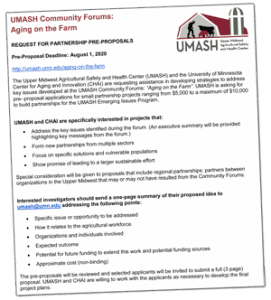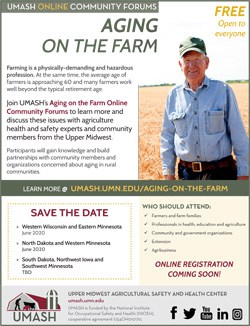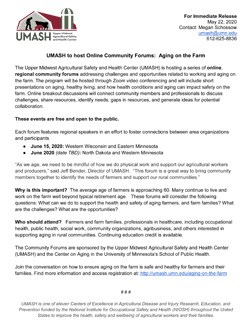MAY 2021 UMASH is an interdisciplinary organization spanning five states and at least five industries (i.e., agriculture, public health, veterinary medicine,
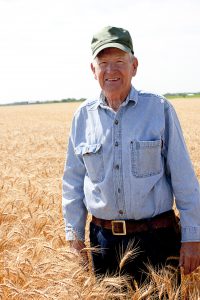
2020 UMASH ONLINE COMMUNITY FORUMS
Aging on the Farm
Agriculture, as a profession, has more mostly “older workers” than any other profession or industry. In addition, the agricultural industry ranks as one of the most hazardous.
The average age of farmers is approaching 60. Many continue to live and work on the farm well beyond typical retirement age. There are many reasons farmers continue to work in farming for decades, including lifestyle choices, being their own boss, enjoyment of the land, and producing food.
With fewer farmers, we need to consider ways to support them as they age. The aging process has implications for work safety including physiological changes such as loss of senses, muscle mass and slower response times. Older farmers are also more prone to injuries, which emphasizes the need for health and safety education and outreach for aging farmers.
Aging in place for farmers raises a number of challenges and opportunities. To support our farmers, we need to raise the awareness of the impact of aging and ways to prevent injuries.
PARTNER PROJECTS
To build upon the ideas generated in the Aging on the Farm Community Forum, UMASH invited partnership proposals that would address forum themes and build partnerships in the region to respond to the needs. Four proposals were selected to partner with UMASH.
THE FORUMS
UMASH hosted a series of online community forums, each with a regional focus in the Upper Midwest.
The purpose of the forums is to engage community and health related organizations and community members who are in regional proximity to one another on the topic of aging in place for the agricultural workforce and their communities. These forums considered the following questions: What can we do to support the health and safety of aging farmers, and farm families? What are the challenges? What are the opportunities?
The forums were hosted through Zoom video conferencing and included short presentations on aging, healthy living, and how health conditions and aging can impact safety on the farm. Online breakout discussions connected community members and professionals to discuss challenges, share resources, identify needs, gaps in resources, and generate ideas for potential collaboration.
OBJECTIVES
- Increase awareness on aging in place and its accompanying health and safety implications
- Identify regional needs to create educational/outreach materials
- Collect community resources to support our farmers
- Encourage community engagement
CEU credits provided by the Midwest Center for Occupational Health and Safety.
EVENT SUMMARY AND COMMUNITY RESOURCES:
VIDEOS AND PRESENTER BIOS:
Click the plus icon to open the box to access the videos, slides, and presenter bios for each forum.
Entire Forum
Challenges and Opportunities of Aging in Rural Communities
Joseph E. Gaugler, PhD
Aging Safely and Productively: What You Need to Know
Lisa F Schiller, PhD, APNP, RN, FNP-BC
Act Your Age: Resistance Training for Healthy Aging
Nicholas M. Beltz, PhD, ACSM-RCEP, CSCS
Farmer Perspective: Aging on the Farm
Randy Koller
Q&A
Presentations
Panel Moderator
Entire Forum
Reasons for Continuing to Farm and Meeting Health Needs in Later Years
Florence Becot, PhD
Aging in Place: Challenges and Opportunities for Farmers
Jane Strommen, PhD
Aging and Agriculture: Health, Hazards, and Issues of North American Elderly Farmers
Carla Wilhite, ODT
Farmer Perspective: Aging on the Farm
Dan Younggren, Sugarbeet Farmer
Q&A
Presentations
Panel Moderator

SHARE YOUR TOP CONCERNS:
We want to hear from you!
Please take 5 seconds or 5 minutes to vote on your top health and safety concerns for aging farmers:
-
Vote online at z.umn.edu/AgingFarmers
VIDEO: Aging on the Farm
DOWNLOADS:
“As we age, we need to be mindful of how we do physical work and support our agricultural workers and producers. This forum is a great way to bring community members together to identify the needs of farmers and support our rural communities.”
CONTACT US:
![]()
Contact Megan Schossow if you would like to share resources on health, safety, or aging.
umash@umn.edu
The Community Forums are sponsored by the Upper Midwest Agricultural Safety and Health Center (UMASH) and the Center on Aging in the University of Minnesota’s School of Public Health.
RELATED NEWS

SPOTLIGHT: UMASH is About the People & the Partnerships
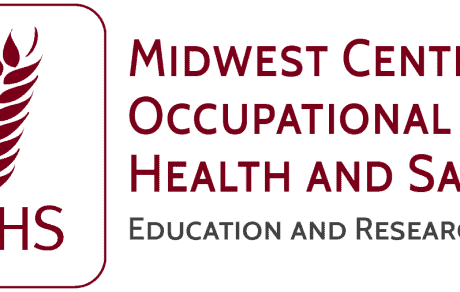
Parkinson’s Disease and Aging in Agriculture
APRIL 2021 Parkinson’s disease impacts over one million people living in the United States, and rural or agricultural communities may encounter challenges

Aging on the Farm: Listening to North Dakota and Minnesota Communities
JULY 2020 On June 30th, UMASH hosted a community forum for the eastern North Dakota and northwest Minnesota region. This was the second of two community

First Online Community Forum a Success
JUNE 2020 On June 15, UMASH hosted a community forum for the western Wisconsin/eastern Minnesota region. The focus was aging on the farm, an important
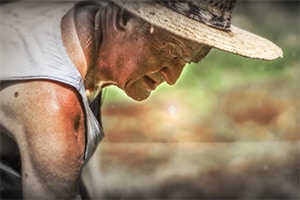
SPOTLIGHT: How Old is Old? Aging in Agriculture
JUNE 2020 How old is old? Depending on who you ask, you may get a number of answers. 45? 55? 65? Is it when you are eligible for senior discounts, safe
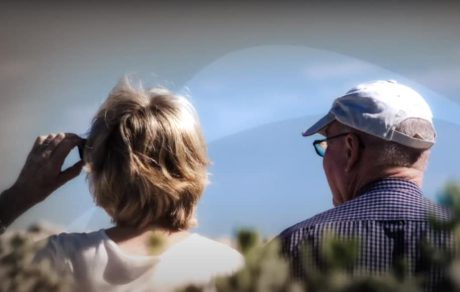
SPOTLIGHT: Aging is a Public Health Issue
JUNE 2020 The United States and many communities around the world are “growing older.” With the changes in demographics today and in the future, aging
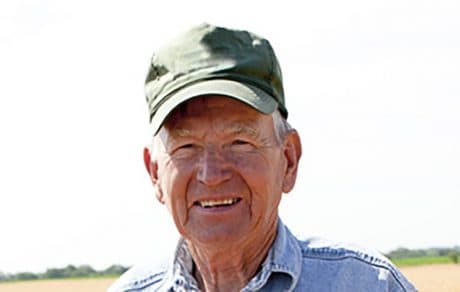
SPOTLIGHT: Aging on the Farm – A Community Forum
JUNE 2020 Aging is part of life and if Benjamin Franklin had his way, none of us would grow old. But we do and with aging comes many changes – physiologically,

NORA Online Symposium: Creating an Age-Friendly Workplace
MAY 2020 With age comes wisdom but also an increased risk of injury. Creating an age-friendly workplace was the focus of this year’s National Occupational

What Are Your Top Health & Safety Concerns for Aging Farmers? We’d Like to Know.
APRIL 2020 The average age of U.S. farmers is approaching 60 years old, making farmers vulnerable to health and safety risks. No matter your age or occupation,

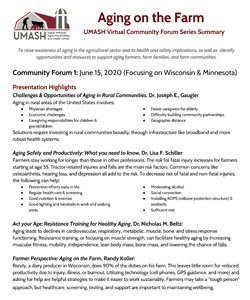
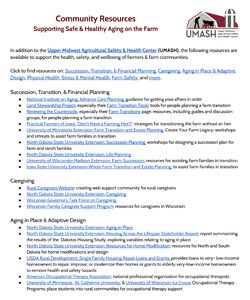

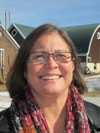
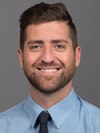 Nicholas M. Beltz, PhD, ACSM-RCEP, CSCS
Nicholas M. Beltz, PhD, ACSM-RCEP, CSCS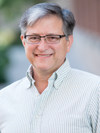
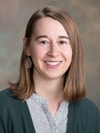 Florence Becot, PhD
Florence Becot, PhD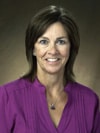
 Carla Wilhite, ODT
Carla Wilhite, ODT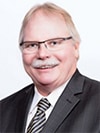 Dan Younggren
Dan Younggren